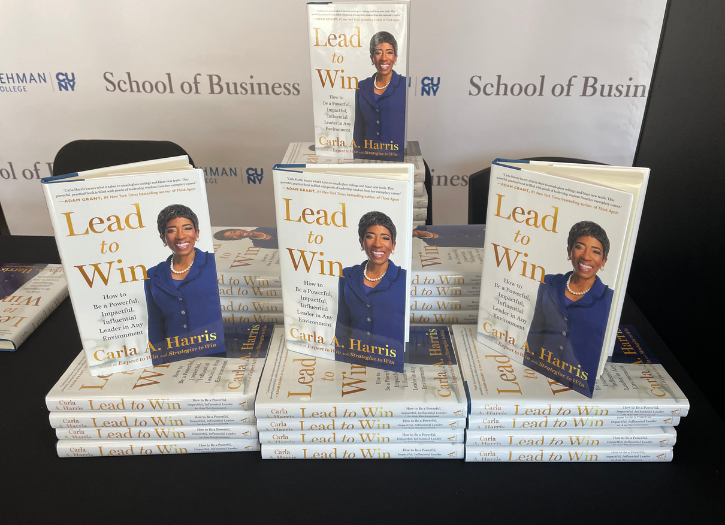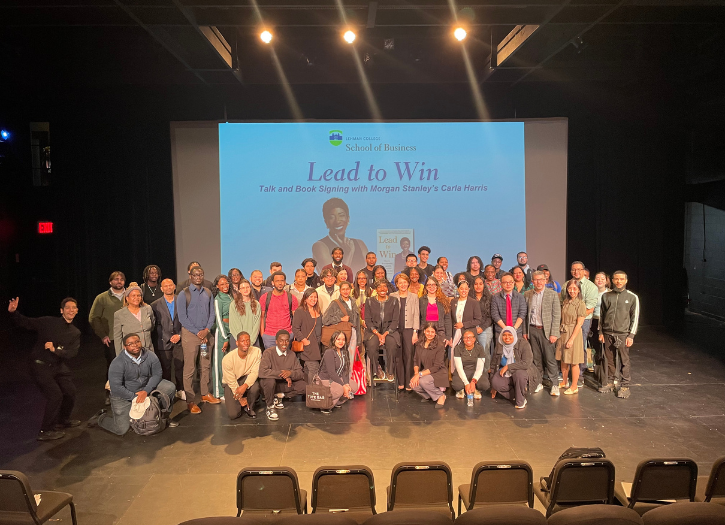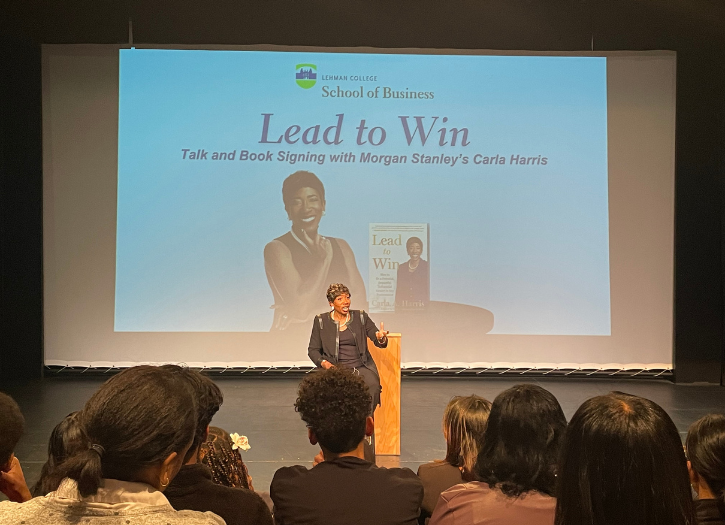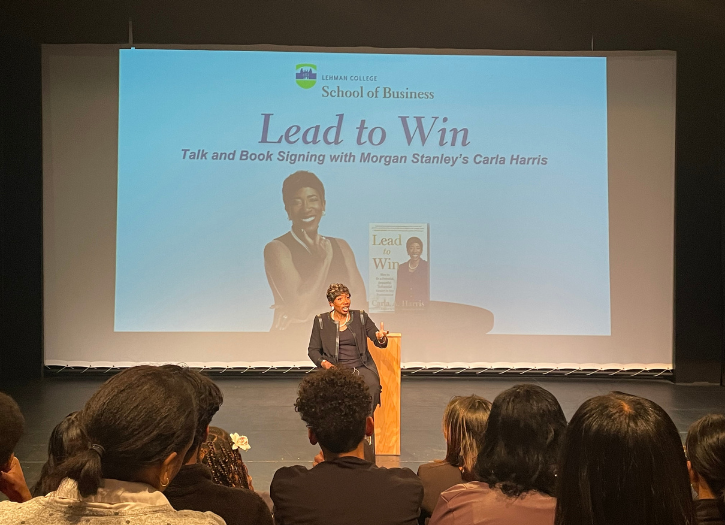The Lehman College School of Business welcomes Morgan Stanley’s Vice Chairman and Managing Director of Wealth Management, Carla Harris, for a motivational book discussion and signing with her third book, “Lead To Win: How to be a Powerful, Impactful, Influential Leader in Any Environment”. On April 29th, ambitious and business-savvy students came to the Studio Theater to learn valuable “pearls”, or steps, to be successful leaders in the corporate financial world.
“You can lead from any seat!” said the international powerhouse speaker. “In today’s environment, you want to show up as a leader as much as possible, because things are evolving so quickly, that people who are in a position of power today may not be the most qualified to be in that seat of power tomorrow. The ability to adapt will have a premium on it. Don’t be fooled that you are the new boy or girl on the block,” she said.
Harris has experience in success with a 30-year history in finance. Throughout her career, she has managed and executed billions of dollars of equity with corporations like UPS, Martha Stewart, and Immunex Corporation. Harris is already a successful published author with her first book, “Expect to Win” in 2009 and her second book “Strategize to Win” in 2014, and now her third book, “Lead to Win” has won the 2024 Anthem Award in the Business Leader of the Year Team and Leadership Category. She has been named by Fortune Magazine’s list of “The 50 Most Powerful Black Executives in Corporate America”, Essence Magazine’s “The 50 Most Powerful Women Who Are Shaping The World,” and Ebony Magazine’s “15 Corporate Women at the Top”.
Harris holds a BA in Economics from Harvard University and an MBA from Harvard Business School. In 2013, she was appointed by President Obama to chair the National Black Women’s Business Council. Harris is a Wall Street veteran. She sits on boards for corporations like Walmart and MetLife.
Harris started the discussion, specifically targeting the graduating seniors. She asked, “How many seniors in the audience are in the process of deciding on what job they’re going to take?” A few seniors raised their hands, and she said, “By the time we get to the Q&A, there will be no question I cannot answer on any topic and give you a prescriptible answer. If you don’t believe, try me!” said Harris.
Harris first spoke about her experience as an undergrad and what she learned when she was dealing with recruiters when they visited Harvard Business School. “A lot of the recruiters gave me the advice: Keep your head down, work hard, and you can get to the top of our organization,” she said. ” It didn’t take me long to figure out that was an incomplete success equation.”
“There are far more important things needed in a success equation. There are things like building relationships, because nobody can do it on their own, how people perceive you will impact how they deal with you, and your authenticity is a distinct competitive advantage, because nobody can be you the way you can be you,” she said.
Harris moved into how she learned to maximize her success. After the first decade of her career, she created her “pearls of wisdom” on being successful and on building the character of a leader. Harris first discusses her three “pearls” in her first book,” Expect to Win”. She explains the three “pearls” and how to apply them to any corporate or finance job and gain the role of a leadership position.
The first and most important “pearl” is how people perceive you, and it will directly impact how they deal with you. A very big component is the view the job has on you and what lens they are looking through.
Harris gave insightful advice for students on what to look for or ask when on job interviews, which is ” What does success look like in this seat?” or ” What three things make a superstar in this seat?”. The reason behind these questions is that these are the three behaviors you need to show up with every day to be successful. If they can’t answer these questions, this allows you to train your supervisor and co-workers to use certain adjectives to associate with you when you work with the company. Consistent behavior around these three adjectives will change people’s perception of you.
Next, Harris asked the audience, “Do any students have an upcoming summer internship?”
A student said that they were hired to be a summer internship at a start-up company, but does not know the three qualities of being a successful intern. ” When you go into this internship, ask yourself or your supervisor, what three qualities will make them say, She was an amazing summer intern!”
“Since it is a start-up company, they may not know what success looks like for their interns. For the next 10 weeks, you have the power to shape the CEO’s mind of what you can deliver. Since it is a new company, they have no success record of what they want in a potential employee, so check in and ask if you are meeting what they need in an intern,” she said. “Why? Because anytime you get a job offer after an internship, it is real currency.”

The second “pearl” is the ability to be willing to take risks.” The only reason a person doesn’t risk is because they are scared. Lehman family, fear has no place in your success equation,” said Harris.
“Taking risks is how you grow. If you don’t take risks and stick to the same, you cannot compete in today’s world. You want to show that you are agile and able to innovate. If you don’t take risks, you show that you should be someone who needs to be eliminated,” she said. “At the margin, it’s always worth taking the risk.”
The third “pearl” is that your authenticity is a distinct competitive advantage, because nobody can be you the way you can be you. ” Anytime you don’t be authentic, you are creating a competitive disadvantage. After four decades on Wall Street, most people I’ve seen are not comfortable in their skin. It doesn’t matter what career you have, your success will depend on you bringing your authentic self to a job environment. When you bring your authentic self to that job environment, people trust you, and trust is the heart of any successful relationship,” she said
After discussing the three “pearls”, Harris started tackling everything on the topic of jobs, whether you have experience or not. “In most cases, job recruiters just need to know what it takes to win in that seat of potential job. When going into an interview, do not be nervous! Why? You have the upper hand. You have to make the recruiter feel like they’re going to make a mistake not hiring you. If you show up with a certain amount of energy and look them in the eye, and make them believe that you are going to deliver,” she said.
“If it is a job you want, you need to put together an amazing cover letter. The first paragraph talks about who you are, the second paragraph talks about why you want this opportunity and why you think you would be good at the position, and in the third paragraph, reiterate your interest in the position,” said Harris.” Most of all, covers should be Error Free! Error Free! Error Free!”

The discussion will enter the final part with a Q&A with Lehman College students and faculty. Some of the advice that Harris provided for a student who asked about being a leader when they are an introvert. “You have to be constructive and productive. You can’t be afraid of making mistakes. Hear me, Lehman family, nobody is successful without making a mistake. I don’t care who you believe is the most successful person that you see; they are not successful without making a mistake,” said Harris.
“Why? Because your mistakes are your most valuable lessons. When life teaches you a lesson, if you don’t pass the test, you will repeat the class. It’s coming again,” she said. ” If you truly learn something, you should be able to apply what you learn and move past that challenge.”
Once the Q&A was over, Harris posed for photos and geared up for the signing of her book. After the session, a reception was held, and the first 100 Lehman students got a free copy of the book, and Harris personally signed each book.
She ended the reception, reminding the Lehman family, ” Everybody has the power to lead. It depends on what kind of leader is in what context. Some people are leaders in an academic context, some may be leaders in an entrepreneurial context, and some may be leaders in a financial context. The question is whether you are willing to invest to get those things,” said Harris. “Always leverage your strengths.”

Photo Credit: Sherica Daley







Add Comment
You must be logged in to post a comment.